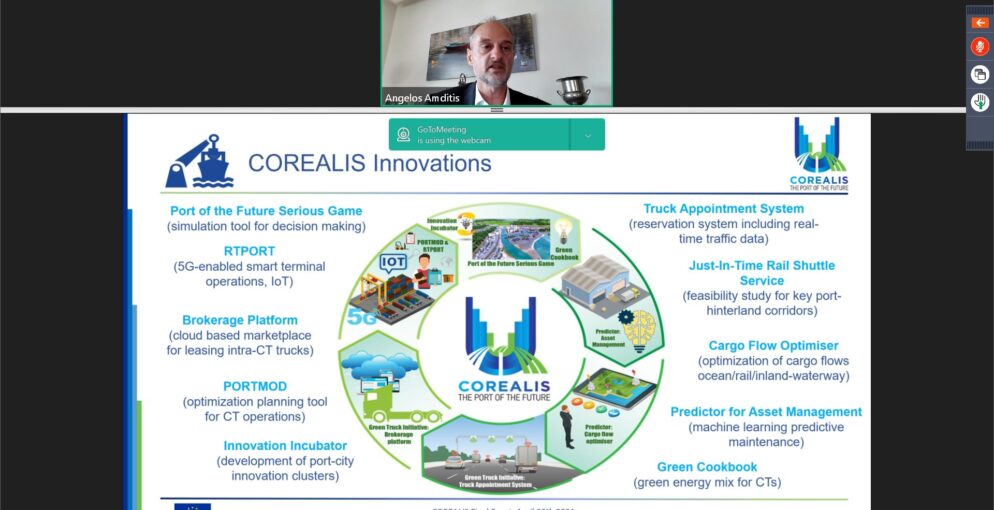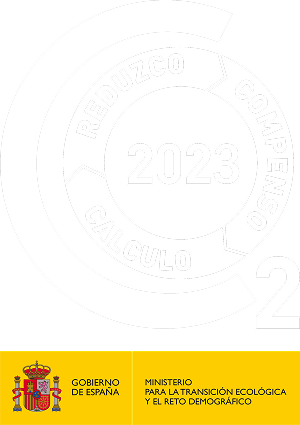Valencia – 29.04.21. Last week was held the final conference of the European project COREALIS which, after 36 months of intense work, concludes with remarkable research achievements in the field of the port of the future.
COREALIS, an initiative funded by the EU H2020 program in which Fundación Valenciaport has actively participated, has worked on the vision of the Port of the Future by proposing a strategic and innovative framework, supported by disruptive technologies, including the Internet of Things (IoT), data analytics, next-generation traffic management and emerging 5G networks, for cargo ports to manage capacity, traffic, efficiency and upcoming and future environmental challenges.
With a total budget of 5.1 million euros, the 17 partners from 10 European and other partner countries have pooled their expertise to contribute to the vision of a more environmentally friendly, socially sustainable and financially viable port of the future. The proposed innovations go beyond the state of the art, aiming to increase efficiency and optimize land use, while being cost-effective, respecting the principles of the circular economy and being useful for the urban environment. These innovations were implemented and tested in real operating conditions in 5 Living Labs in leading European ports: Piraeus, Valencia, Antwerp, Livorno and Haminakotka.
At the end of April 2021, the COREALIS project ended with remarkable research achievements that were widely disseminated to the scientific and industrial community during a truly fruitful final conference.
About the COREALIS Final Conference
The COREALIS Final Conference was held virtually on April 23 with a large attendance, reaching 150 participants.
Dr. Angelos Amditis, project coordinator, gave a warm welcome to all participants and marked the beginning of the meeting which started with an intervention by the project manager at INEA, Sergio Escribà, who highlighted that the COREALIS project accurately addressed the pillars of climate, energy and transport challenges in the port environment, and paid special attention to the crucial drive for stakeholder feedback for the Port of the Future. The opening session concluded with a presentation by Frank Kho, CEO of the Terminal Industry Committee 4.0, who explained how the cargo handling sector can realize its full potential and embrace the fourth industrial evolution.
The following two sessions were dedicated to the presentation and discussion of the palette of technological and social innovations driven by the technical partners of the project: SGS, VTT, MARLO, ERICSSON, NEC, MOSAIC, DELTARES, Fundación Valenciaport and DYNNIQ.
The COREALIS innovation palette consists of:
– The COREALIS Green Truck initiative, which implements: i) A dynamic ground transportation management system that aims to coordinate and optimize truck arrivals based on traffic, terminal operations and other operations in the port area, so as to minimize queues, waiting times and congestion and ii) the COREALIS Brokerage Platform, a port asset brokerage platform that enables equipment booking through an online Marketplace.
– The COREALIS PORTMOD, which aims to increase operational efficiency, personnel safety, emissions analysis and improved data exchange by modeling and optimizing cargo and data flows within a port.
– The COREALIS RTPORT, which implements a real-time control system for port operations in general cargo terminals via a 5G network.
– The COREALIS Predictor, a tool for dynamic and optimized management of port asset maintenance that enables predictive maintenance of container terminal equipment.
– The COREALIS Cargo Flow Optimizer, which aims to help port managers plan their infrastructure investments by optimizing cargo flows in all modes of transport.
– The COREALIS Port of the Future Serious Game, a game for port stakeholders aimed at assessing the viability and sustainability of a port’s socio-economic and environmental development within the surrounding coastal and urban area.
– The COREALIS Green Cookbook, which aims to help ports reduce their environmental footprint, assess their energy profiles and adopt cleaner modes of transport and energy sources.
– The COREALIS Innovation Incubator Scheme, which aims to turn the port into a hub of the entrepreneurial and innovative ecosystem to boost digitization and innovation in the sector.
A special part of the day was the high-level interactive and constructive discussion with prominent guests from various EU organizations (CNIT, European Inland Waterway Transport Platform-IWT, Piraeus Container Terminal-PCT) and the ports of Antwerp, Barcelona, and Rotterdam, who presented their “vision and challenges towards the port of 2030 and beyond”.
The project coordinator concluded the day by summarizing the achievements of COREALIS and stressing that “COREALIS has laid a foundation, but there is still a long way to go to achieve the operational efficiency and climate neutrality established by the European Green Deal”.


